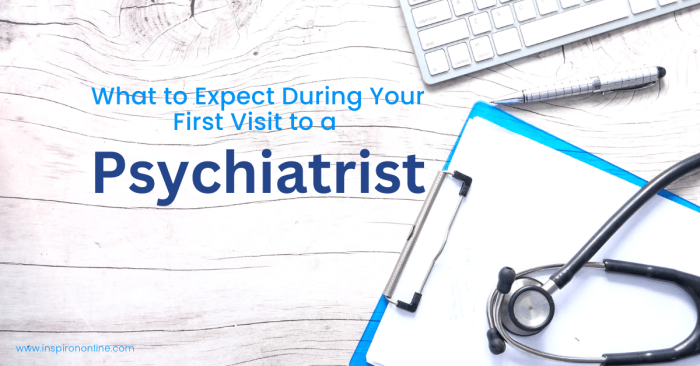What to Expect During Your First Psychiatry Appointment: A Comprehensive Guide

Embarking on your first psychiatry appointment journey can be both daunting and enlightening. This guide will walk you through the essential aspects to anticipate during this crucial step towards mental well-being.
As you delve deeper into the world of psychiatric care, understanding what to expect during your initial appointment is key to ensuring a productive and beneficial experience.
Introduction to Psychiatry Appointment
During a first psychiatry appointment, individuals meet with a mental health professional to discuss their emotional well-being, symptoms, and concerns. This initial consultation serves as an opportunity for the psychiatrist to assess the individual's mental health and determine an appropriate treatment plan.
Purpose of a First Psychiatry Appointment
- Assessment of Mental Health: Psychiatrists use the first appointment to evaluate the individual's mental health status, including symptoms, stressors, and any underlying conditions.
- Establishing a Relationship: Building a rapport with the psychiatrist is crucial for effective treatment and open communication throughout the therapeutic process.
- Formulating a Treatment Plan: Based on the assessment, the psychiatrist develops a personalized treatment plan that may include therapy, medication, or other interventions.
Importance of Seeking Mental Health Care
- Early Intervention: Seeking mental health care early can prevent symptoms from worsening and improve overall well-being.
- Validation and Support: Talking to a mental health professional can provide validation, support, and guidance during challenging times.
- Improving Quality of Life: Addressing mental health concerns can enhance quality of life, relationships, and daily functioning.
Common Reasons People Schedule Their First Psychiatry Appointment
- Depression and Anxiety: Many individuals seek psychiatric help for symptoms of depression and anxiety, such as persistent sadness, worry, or panic attacks.
- Relationship Issues: Difficulties in relationships, whether with family, friends, or partners, can prompt individuals to seek guidance from a psychiatrist.
- Stress and Burnout: High levels of stress, overwhelming responsibilities, and burnout at work or school often lead individuals to seek mental health support.
Preparation for the Appointment

Before your first psychiatry appointment, it is essential to prepare yourself both mentally and logistically. Here is a checklist of things to consider before your appointment:
Checklist for Preparation:
- Write down any symptoms you have been experiencing, including when they started and how they have been affecting your daily life.
- Make a list of any medications you are currently taking, including dosage and frequency.
- Prepare a list of questions or concerns you may have for the psychiatrist.
- Bring any relevant medical records, such as previous psychiatric evaluations or test results.
- Ensure you have a way to get to and from the appointment, especially if you may feel emotionally overwhelmed afterwards.
Being honest and open during your psychiatry appointment is crucial for the psychiatrist to provide you with the best possible care. Remember that psychiatrists are trained professionals who are there to help you, so sharing your thoughts and feelings openly can lead to a more accurate diagnosis and effective treatment plan.Your family history and personal medical history play a significant role in your first psychiatry appointment.
Genetics can influence mental health conditions, so providing information about any mental illnesses in your family can help the psychiatrist understand your risk factors. Additionally, your personal medical history, including any past traumas or medical conditions, can provide valuable context for your current mental health concerns.
Be prepared to discuss these aspects during your appointment to ensure a comprehensive assessment.
What to Bring

When attending your first psychiatry appointment, it is important to bring along certain items to ensure a smooth and productive session.
List of Essential Items
- A list of current medications you are taking, including dosage information
- Any relevant medical records or documentation from previous healthcare providers
- A form of identification, such as a driver's license or passport
- Your insurance information, including your insurance card and any necessary co-payments
- A notebook or journal to jot down important information discussed during the appointment
Significance of Bringing a List of Current Medications
Having a list of current medications you are taking is crucial for your psychiatrist to have a comprehensive understanding of your health status. This information helps them assess potential interactions between medications, identify any side effects, and make informed decisions about your treatment plan.
Importance of Having Insurance Information Available
Having your insurance information readily available ensures that your appointment runs smoothly without any delays. It allows the administrative staff to verify your coverage, process any necessary paperwork, and make billing arrangements. Additionally, knowing your insurance details upfront can help you understand any financial responsibilities associated with your treatment.
The Appointment Process
During your first psychiatry appointment, you can expect the following typical process. The psychiatrist will start by asking you some questions about your medical history, current symptoms, and any previous treatments you may have had. This information helps them understand your situation better and determine the most appropriate treatment plan for you.
Confidentiality and Privacy Policies
Confidentiality and privacy are essential aspects of any psychiatry appointment. Psychiatrists are bound by strict confidentiality rules, meaning that they cannot disclose any information you share with them during the session unless required by law or if there is a risk of harm to yourself or others.
It is crucial to discuss any concerns you may have about privacy with your psychiatrist to ensure you feel comfortable sharing your thoughts and feelings.
Duration of the Appointment
A typical first psychiatry appointment usually lasts between 45 minutes to one hour. This timeframe allows the psychiatrist to gather necessary information about your mental health, establish a diagnosis if needed, and discuss potential treatment options with you. It is essential to be prepared for the appointment to ensure that you make the most out of the time spent with the psychiatrist.
Building Rapport with the Psychiatrist
Building a strong rapport with your psychiatrist is essential for effective treatment and therapy. A good relationship based on trust and open communication can greatly enhance the therapeutic process and help you achieve better mental health outcomes.
Establishing Trust and Communication
- Be open and honest: Share your thoughts, feelings, and concerns openly with your psychiatrist. Honesty is crucial for them to understand your situation accurately.
- Listen actively: Pay attention to what your psychiatrist has to say and ask questions if you need clarification. Listening actively shows respect and fosters a collaborative relationship.
- Respect boundaries: Understand and respect the boundaries set by your psychiatrist. This includes confidentiality and professional boundaries that are in place to protect your well-being.
- Give feedback: Provide feedback on the treatment plan, medication effects, and therapy sessions. Your input is valuable for adjusting the treatment to better suit your needs.
Effective Communication of Concerns and Symptoms
- Prepare in advance: Before your appointment, make a list of your concerns, symptoms, and any questions you may have. This can help you communicate effectively during the session.
- Be specific: Try to be as specific as possible when describing your symptoms or concerns. Details like when symptoms started, frequency, and triggers can help your psychiatrist form a more accurate diagnosis.
- Use "I" statements: Express your feelings and experiences using "I" statements to take ownership of your emotions. This can help your psychiatrist understand your perspective better.
- Ask for clarification: If you don't understand something your psychiatrist says, don't hesitate to ask for clarification. Clear communication is key to a successful therapeutic relationship.
Goal Setting and Treatment Planning
Setting goals and creating a treatment plan are essential parts of the first psychiatry appointment. This process helps establish a clear direction for the patient's mental health journey and ensures that both the psychiatrist and the patient are on the same page regarding the desired outcomes.
Setting Goals
During the first psychiatry appointment, the psychiatrist will work with the patient to identify specific goals they want to achieve through treatment. These goals can vary depending on the individual's unique needs and circumstances. It could involve managing symptoms, improving daily functioning, enhancing relationships, or working towards personal growth and development.
- Goals should be specific, measurable, achievable, relevant, and time-bound (SMART).
- The psychiatrist will help prioritize these goals based on their importance and feasibility.
- Collaboratively setting goals empowers the patient and increases their motivation to actively participate in the treatment process.
Creating a Treatment Plan
Once the goals are established, the psychiatrist and the patient will work together to develop a comprehensive treatment plan that Artikels the strategies and interventions to achieve those goals.
It is essential to tailor the treatment plan to the individual's needs, preferences, and strengths.
- The treatment plan may include a combination of medication, therapy, lifestyle modifications, and other interventions.
- Regular monitoring and adjustments to the treatment plan may be necessary to ensure progress towards the goals.
- Open communication between the psychiatrist and the patient is crucial for the success of the treatment plan.
Different Treatment Options
During the appointment, the psychiatrist may discuss various treatment options based on the patient's diagnosis, symptoms, and goals.
- Medication: Prescription of psychiatric medications to manage symptoms.
- Therapy: Referral to a therapist for individual, group, or family therapy sessions.
- Other Interventions: Techniques such as cognitive-behavioral therapy, mindfulness practices, or relaxation exercises.
Closing Summary
In conclusion, your first psychiatry appointment sets the foundation for a collaborative and supportive relationship with your mental health provider. By being prepared and open, you pave the way for a journey towards holistic well-being and self-discovery.
Key Questions Answered
What should I do if I feel uncomfortable during the appointment?
It's important to communicate your feelings with your psychiatrist. They are there to help and make you feel at ease.
Can I bring a friend or family member to the appointment?
While it's common to attend appointments alone, you can always ask your psychiatrist about bringing a support person if it makes you feel more comfortable.
How often should I expect to have follow-up appointments after the initial visit?
The frequency of follow-up appointments varies based on your individual treatment plan. Your psychiatrist will discuss this with you during your initial appointment.

